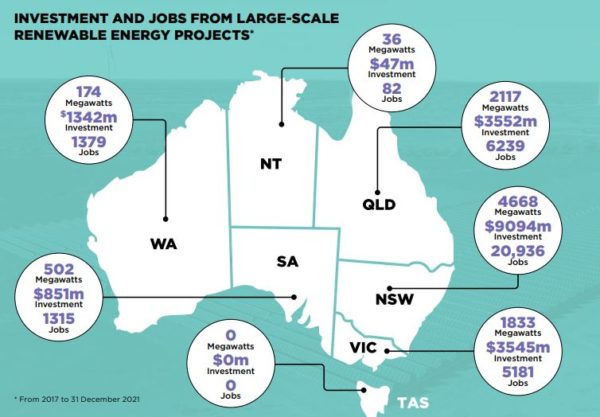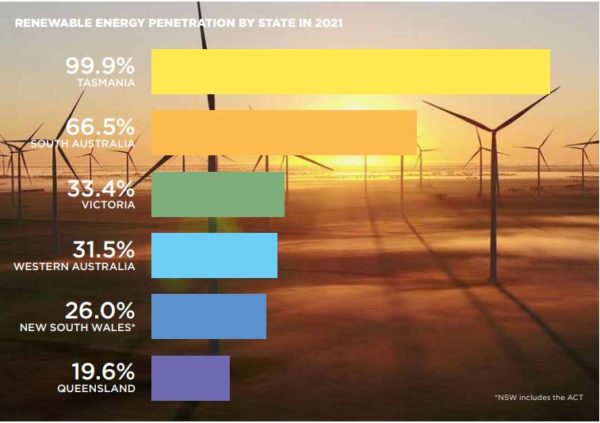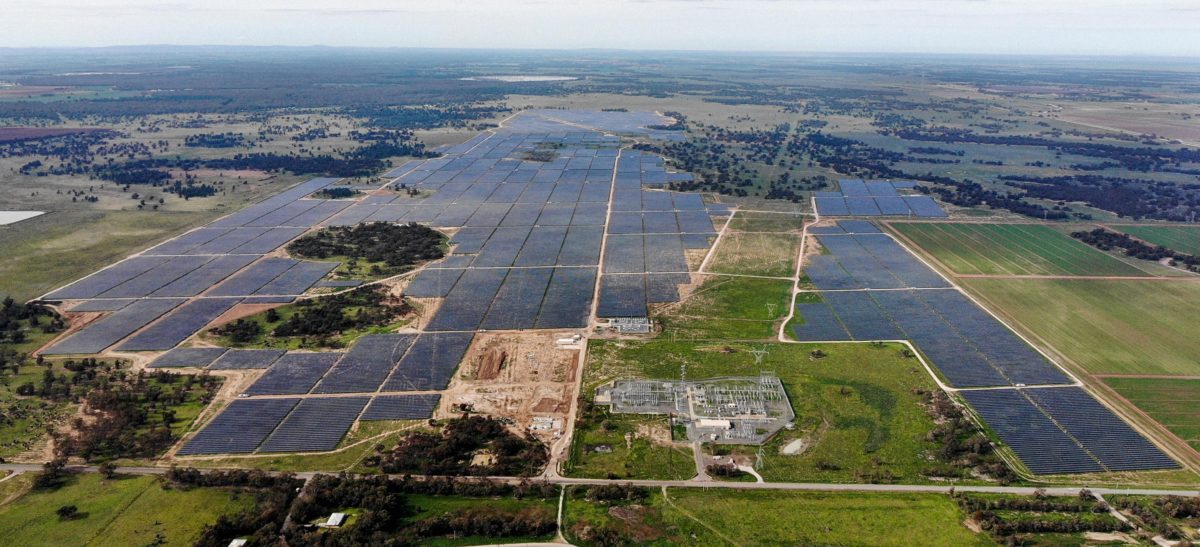A new report published by the Clean Energy Council (CEC) shows renewable energy delivered a record 32.5% share of Australia’s electricity market in 2021, driven by an increase in small and large-scale solar PV, which surged to 12.4%.
The 2022 edition of the CEC’s annual Clean Energy Australia Report shows the nation’s renewable energy industry powered on in 2021, generating more clean energy than ever before and adding a record amount of new capacity but while construction activity was strong during 2021, investment decisions in new projects have dipped.
CEC chief executive Kane Thornton said the level of financial commitments for new large-scale renewable energy projects fell by more than 17% from $4.5 billion in 2020 to $3.7 billion in 2021.
The growth of Australia’s renewable energy was again led by small-scale solar. The rooftop solar sector added 3.3GW of new capacity in 2021, the fifth year in a row it has set a record for new installed capacity. Small-scale solar accounted for 24.9% of Australia’s total renewable energy generation in 2021,
The large-scale sector also had a bumper year in 2021, adding 2,955MW of new capacity across 27 projects, which was almost 1GW more than that added in 2020.
The hydrogen sector’s development also accelerated in 2021 with the industry having a pipeline of more than 100 projects worth $163 billion by the end of the year.

The battery energy storage sector also made considerable strides in 2021, including the completion of Australia’s largest battery with the commissioning of the 300MW/450MWh Victorian Big Battery in December.
“2021 was also a breakthrough year for big batteries, with 30 large-scale batteries under construction at the end of 2021 with a combined capacity and storage duration of 921MW/1169MWh,” Thornton said. “Energy investors are clearly confident about the important role and commercial viability of big batteries to deliver the reliable power of the future.”
Thornton said the impressive achievements are however clouded by a significant slowdown in the pipeline for new large-scale renewable energy projects. New capacity reaching financial commitment dropped from 3.16GW across 28 projects in 2020 to 2.11GW across 20 projects in 2021.
“This significant reduction is due to continued policy uncertainty combined with the challenges associated with connecting renewable energy projects to the grid,” he said.
“While investors are enthusiastic about investing in new large-scale renewable energy projects, these challenges have increased risks and slowed down the number of new projects coming forward. The slowdown is concerning in light of expectations that coal-fired power plants will continue to close earlier than previously anticipated.”

Despite the slowdown, the CEC said 68 large-scale projects – including 42 solar farms and two hybrid wind and solar projects – were under construction or financially committed at the end of 2021, representing more than 9GW of new capacity and more than $18 billion of investment.
Almost 3GW of new large-scale capacity was added in 2021, with the country’s three largest solar farms all beginning to send power to the grid during the year. The largest solar project commissioned in 2021 was the 275MW Darlington Point Solar Farm, developed by Edify.
The report also highlights that corporate renewable power purchase agreements (PPAs) had another strong year in 2021. There were 18 corporate renewable PPAs announced in 2021, directly contractingmore than 800MW.
Tasmania continues to lead the nation in clean energy market share with 99.9% of the state’s electricity generation delivered by renewables in 2021. South Australia at 66.5% and Victoria at 33.4% recorded the next largest market shares.
This content is protected by copyright and may not be reused. If you want to cooperate with us and would like to reuse some of our content, please contact: editors@pv-magazine.com.









1 comment
By submitting this form you agree to pv magazine using your data for the purposes of publishing your comment.
Your personal data will only be disclosed or otherwise transmitted to third parties for the purposes of spam filtering or if this is necessary for technical maintenance of the website. Any other transfer to third parties will not take place unless this is justified on the basis of applicable data protection regulations or if pv magazine is legally obliged to do so.
You may revoke this consent at any time with effect for the future, in which case your personal data will be deleted immediately. Otherwise, your data will be deleted if pv magazine has processed your request or the purpose of data storage is fulfilled.
Further information on data privacy can be found in our Data Protection Policy.